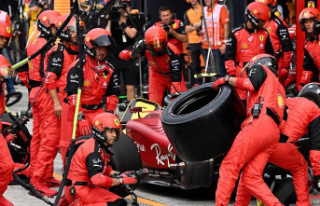A quick solution to the energy crisis does not appear to be in sight, on the contrary. Concerns about an economic disaster in Europe are growing. Russia's recent gas freeze triggers stock markets and euro to plummet. The gas price is again approaching the recent record.
The fear of a recession in Europe due to a lack of Russian gas supplies triggers hectic selling on the domestic stock markets. "The fear of a Lehman-like crisis in the European energy sector is growing," said analyst Jochen Stanzl from the online broker CMC Markets. The DAX fell by more than 3 percent to 12,642 points and was heading for its biggest daily loss since the beginning of March. At that time, the first battles over the Ukrainian nuclear power plant at Zaporizhia had terrified investors.
The EuroStoxx50 has now slipped by 2.6 percent to 3451 points. At the same time, the euro fell by up to 0.8 percent to a 20-year low of $0.9875. At the same time, investors were scrambling for available natural gas. As a result, the European futures rose by 34 percent to 280 euros per megawatt hour and headed back towards its most recent record high.
Gazprom announced at the beginning of the month that it would not supply gas to Germany and other European countries via the Nord Stream 1 Baltic Sea pipeline until further notice. The reason given by the Russian state energy giant was that an oil leak had been discovered during maintenance work. The Federal Network Agency as the regulatory authority and Siemens Energy as the supplier of pipeline technology contradicted this representation.
A quick solution to the energy crisis is not in sight, warned Naeem Aslam, chief market analyst at brokerage firm AvaTrade. Therefore, Europe is threatened with an economic disaster. At the same time, stockbrokers were puzzled as to whether and how the current situation would affect the interest rate decision by the European Central Bank (ECB) on Thursday. ING Bank investment strategist Antoine Bouvet said that the ECB is now focusing more on actual inflation than on expectations. At the same time, investors viewed the planned relief packages from the federal government and other European countries for energy consumers as an opportunity for the ECB to raise interest rates further. Most of them are currently anticipating an interest rate hike of 0.75 percentage points.
CMC expert Stanzl also pointed out the risk of further turbulence in natural gas prices. Because of the discussion about the energy price cap, the number of open contracts - an indicator of the trading volume on derivatives markets - has fallen in the past few days. "This may have reduced the ability of energy traders and power producers to hedge against renewed price increases or to exit existing positions."
If investors are unable to provide the subsequent security deposits due to the stock exchange due to the current increase, there is a risk that transactions will be forced to be closed. "This could lead to uncontrolled price increases that are detached from the actual relationships between gas supply and demand." Against this background, the shares of the gas supplier Uniper, which was already in difficulties due to a lack of Russian deliveries, fell by 13 percent at times to a record low of 4.91 euros. Since the company had to stock up on natural gas from other sources in the short term, the losses at the current prices added up to 100 million euros per day, the analysts at Credit Suisse calculated.
The titles of the Uniper mother Fortum slipped in Helsinki by 6.2 percent at times and at 9.48 euros were as cheap as they were 18 years ago. RWE and EON also went down, with their shares falling in price by up to 4.3 percent. The electricity companies suffered, among other things, from the planned skimming off of chance profits from energy companies. The idea is not new, but is now becoming concrete, said a stockbroker.












